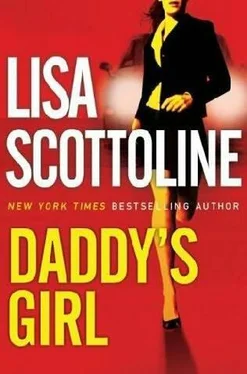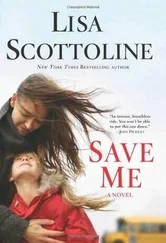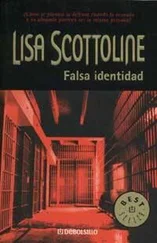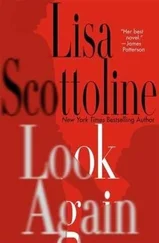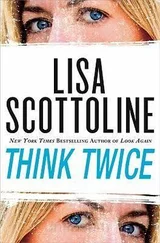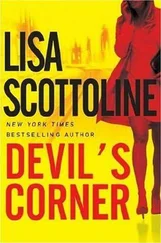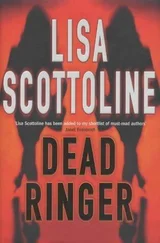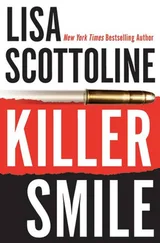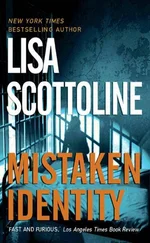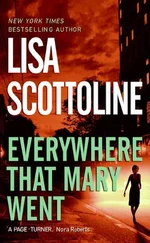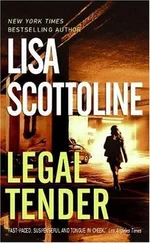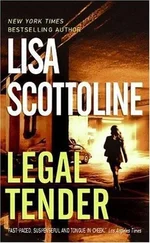She motored south under a sky swept of clouds, brightening bottom to top in shades of pale pink, dark rose, then rich blue. Rain had washed away most of the snow beside the road, revealing patches of muddy brown. She checked the smudgy rearview mirror to make sure no black pickups were following her, but traffic was light and apparently innocuous. She felt reasonably safe, in a car that no bad guy could identify as hers.
In time she exited the highway, entered the city of Chester, and drove through its rundown neighborhoods, looking for the right street. Brick rowhouses lined blocks strewn with debris, and shutters hung lopsided on windows insulated with Saran Wrap and covered with iron bars. A hand-lettered beware of dog sign sat stuck in a door, next to a child's drawing of Santa Claus in Crayola colors. Trash cans had been overturned, and old cars sat parked along the streets. She found the house, parked the Kia, and straightened the black NASCAR cap she'd bought as a makeshift disguise at a Wawa convenience store. She checked the rearview and noted that the cuts on her cheeks had grown faint. Things were looking up, if she didn't dwell on that impending homicide charge thing.
She got out of the car, locked it, crossed to the house, and knocked tentatively on the front door, which was opened by an older African American woman who peered timidly around the side of the door. Her eyes were a milky brown and deep-set, cold and flickering with caution, in a full face. Her hair was a straightened and thin gray and she wore it to her chin, with sparse bangs cut midway across her forehead, like a septuagenarian Betty Boop.
"My name is Nat Greco. I'm sorry to bother you, but I'm looking for the residence of Simon Upchurch."
"Buried him Thursday." The old woman frowned, leaning closer to the door.
"I'm sorry. I was at the prison the day he was killed. I wondered if I could come in and talk to you." Nat raised a white bag from Wawa. "I brought some doughnuts."
"I got diabetes."
Or not. "Maybe if I could come in, we could talk. It wouldn't take long."
The woman opened the door a crack and eyed Nat up and down. "You're jes 'a lil' thing."
"Thanks." I think. "It's cold. You must be cold, with the door open."
"I'm warmer 'n you." The old woman smiled crookedly, showing spaces between her teeth, and Nat laughed with her.
"I'm here because I wanted to talk to you about Simon. Was your son?"
"My brother's. I raised him, but he wasn't mine.”
“Could I come in? Please? It's important."
The front door opened a crack, and after a minute, the woman unlocked the barred door and propped it open with a hand. "Thanks," Nat said, stepping inside.
The woman wore a maroon fleece top with a pair of dark stretch pants, and was short and sturdy as she powered in terrycloth slippers through a darkened living room stuffed with couches, mismatched chairs, several wooden end tables, three old TVs, and four rolled-up rugs. Nat almost tripped on a footstool on her way into a small kitchen, where the woman showed her a wooden chair.
"You can sit here," she said, looping a thick finger around the top rung of the other chair.
"Thanks." Nat set the doughnut bag on the table, only half of which was cleared. The other half held stacks of white plates, two napkin holders, and three sets of identical glass salt-and-pepper shakers, restaurant style. Extra dishes, salad plates, and glasses of various sizes lined the kitchen counters. It was like living in a warehouse, but eccentricity wasn't Nat’s concern. She herself had a To-Be-Read room. "I'm Nat Greco."
"I remember."
"I didn't catch your name."
"I didn't tell you it."
Nat couldn't get her students to participate, either. She wished for a Clinique mustache.
"You don't look like a cop killer," the woman said abruptly.
"You knew who I was?"
"I watch TV. I keep up. You think I don't?"
"Okay, then you know."
"Take off that ugly hat. Take it off."
Nat complied, taking off the hat and setting it next to the doughnuts. "If you knew who I was, why'd you let me in?"
"You didn't do it, did you?"
Nat blinked. "No."
"Just cause the cops say you did it, doesn't mean you did it. Cops lie all the damn time, even on HI' white girls. They lied on Simon. He never shoulda gone to jail." The woman shook her head slowly. After a pause, she said, "Belle Rhoden's my name."
"Pleased to meet you, Belle."
"Call me Mrs. Rhoden. I honor my late husband." I m sorry.
"He died thirty-two years ago. Would you like some water?"
"I'd love some."
Mrs. Rhoden turned, took an upside-down glass from the counter, shut off the tap, and set the glass of water in front of Nat.
"Thanks." Nat took a sip. "I'll get to the point. I was wondering if you could tell me a little bit about Simon."
"What do you mean?"
Nat didn't want to lead with the OxyContin part. "Well, I was at the prison when the riot broke out. I went to get help and I ran into the room where Simon was killed."
Mrs. Rhoden went to the sink, took another glass from the counter, and filled it with water.
“I would have tried to help him, but he was… gone." Nat relived the gruesome scene. Upchurch lying on the floor, the metal blade sticking from his chest. She felt embarrassed that she couldn't remember much more about him. She'd been focused on Saunders because he was still alive. And maybe, she had to admit, because he wasn't an inmate.
Mrs. Rhoden sipped some water, set the glass down on the counter, picked up a paper towel, and set it on the top of the glass, inexplicably.
"One of the C.O.s who was there told me how Simon was killed," Nat said, "but the story doesn't make sense."
"CO. That a guard?"
"Yes."
"What'd he say happened? All they told me was it happened during the riot. That's what the papers said, too." Mrs. Rhoden thought a minute. "I been too upset to think about how he died 'xactly, just yet. They asked me did I want to identify him, and I said, No, sir."
"I understand." Nat paused. "Do you mind talking about it now? It's my understanding that he wasn't killed in the riot."
"Go on ahead."
"Well, the guard said that he and another guard brought Simon into an office because he was caught with marijuana, and that Simon pulled a homemade knife and stabbed Ron Saunders, one of the guards."
Mrs. Rhoden gasped softly, and Nat felt a guilty twinge.
"He said that Simon tried to kill him, too, but they fought for the knife, and the guard killed Simon in self-defense."
"Who told you that?" Mrs. Rhoden asked, her tone limned with anger.
"The guard who survived. Joe Graf."
"That's a flat-out lie, that's what that is."
"Why?" Nat's heartbeat quickened.
"Simon would never stab nobody. It jes' wasn't his nature. He got picked on all his life, beat up. Besides, he wasn't big enough. He was only about a hundred and sixty pounds and five foot seven."
Nat considered the source. Mrs. Rhoden loved her nephew, and she could be in denial. After all, Upchurch had been in prison for something.
"And he never smoked reefer. Ever."
"How do you know?"
"He had asthma very bad."
"Some people with asthma smoke marijuana," Nat said, testing her.
"Not Simon. His father-that's my brother-he died of an asthma attack. Simon was right there, only thirteen. The boy held his own father while he passed, waiting for an ambulance. Reefer would've killed him, and he knew it. Had a problem with cigarettes, even. If he was around cigarette smoke, he couldn't take but a breath."
Nat felt a chill. It rang true. But was Upchurch dealing OxyContin with the C.O.s? "Did Simon know either of the guards, Ron Saunders and Joe Graf?"
"Not that I know of."
Читать дальше
